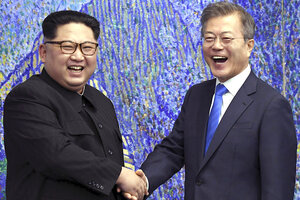A welcome warming between the Koreas
After an especially chilly period, North and South Korea are talking to each other again. That alone doesn't solve any big issues. But it’s a start.

North Korean leader Kim Jong Un, left, poses with South Korean President Moon Jae-in for a photo at the border village of Panmunjom in 2018. Moon and Kim agreed July 27 to restore suspended communication channels between their countries.
Korea Summit Press Pool via AP/FILE
Steps in the right direction, even if small, need to be noted – especially when the stakes involved are high.
This week, North and South Korea announced they would resume communication with each other after more than a year of silence. “The whole Korean nation desires to see the North-South relations recovered from setback and stagnation as early as possible,” the official North Korean news agency said.
United Nations Secretary-General António Guterres and an unnamed senior U.S. official quickly nodded their approval.
Some 13 months ago, in a display of displeasure, the North blew up a joint liaison office (unoccupied at the time) that had been constructed in its territory for the purpose of better communication with the South. It was seen as a dramatic signal of a new era of chilly relations with its southern neighbor.
That move followed a showy 2019 summit between North Korean leader Kim Jong Un and then-U.S. President Donald Trump. The United States sought to persuade North Korea to give up its nuclear missile program in exchange for an end to economic sanctions on it. But no agreement emerged.
Mr. Kim’s aim still seems to be to use the threat of building a stockpile of nuclear missiles capable of reaching the U.S. mainland as a way to win concessions, but without giving up the nuclear arsenal.
In itself the fresh move to reopen communication with South Korea, a longtime U.S. ally, doesn’t get at the nuclear standoff. But it’s a welcome start.
Changing times may be forcing Mr. Kim into new approaches. The threat from the COVID-19 pandemic and the effect of economic sanctions may be taking a toll.
North Korea does not admit to having any cases of COVID-19, and no signs of starvation or social unrest have been observed as a result of the sanctions.
But after making a splash with a large delegation at the 2018 Winter Olympics in South Korea, Mr. Kim has kept his athletes home from the Tokyo Games now underway. His concerns over the possibility of spreading the pandemic in his country, which maintains tight controls on its borders, may have outweighed the opportunity for any propaganda victories from attending these Games.
In January Mr. Kim displayed some uncharacteristic contrition, acknowledging the economic challenges his country faces and saying that he had learned “painful lessons.” He may have decided that warming relations with South Korean President Moon Jae-in now represents the best path to influencing the U.S.
“Our patience will achieve more than our force,” Edmund Burke, the 18th-century statesman and member of the British Parliament, once observed. More favorable conditions for peace on the Korean Peninsula, and a lessening of nuclear tensions, may be emerging. Those who long to see those results must remain open to each opportunity that offers progress.

